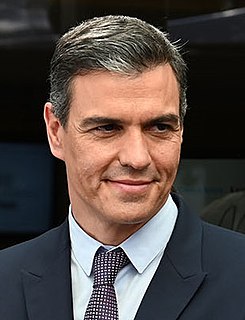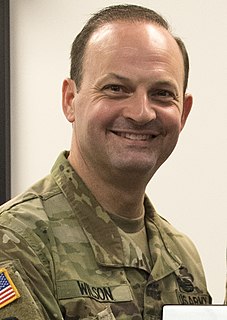A Quote by Pedro Sanchez
I promise by my conscience and honor to faithfully fulfill the obligations of the office of president of the government with loyalty to the King, and to keep and enforce the Constitution as the fundamental norm of the State.
Related Quotes
The President, and government, will only control the militia when a part of them is in the actual service of the federal government, else, they are independent and not under the command of the president or the government. The states would control the militia, only when called out into the service of the state, and then the governor would be commander in chief where enumerated in the respective state constitution.
The duty imposed upon him [the president] to take care that the laws be faithfully executed, follows out the strong injunctions of his oath of office, that he will 'preserve, protect, and defend the Constitution.' The great object of the executive department is to accomplish this purpose; and without it, be the form of government whatever it may, it will be utterly worthless for offence or defense; for the redress of grievances or the protection of rights; for the happiness, or good order, or safety of the people.
The states have authority to interpret the Constitution, enforce it, and protect the people from violations of it by the federal government In the first place, there is not a syllable in the plan under consideration which directly empowers the national courts to construe the laws according to the spirit of the Constitution, or which gives them any greater latitude in this respect than may be claimed by the courts of every State.
Despite two decisions, in 2008 and 2010, by the U.S. Supreme Court unequivocally affirming that the Second Amendment to the Constitution guarantees an individual right to keep and bear arms against infringement by the government, state legislatures continue to do just that - enact laws that significantly infringe this fundamental human right.
Listen to your conscience regarding something that you simply know you should do, then start small on it - make a promise and keep it. Then move forward and make a little larger promise and keep it. Eventually you'll discover that your sense of honor will become greater than your moods, and that will give you a level of confidence and excitement that you can move to other areas where you feel you need to make improvements or give service.
It [the Constitution] didn't break free from the essential constraints that were placed by the founding fathers in the Constitution, at least as it's been interpreted, and the Warren court interpreted it in the same way that generally the Constitution is a charter of negative liberties. It says what the states can't do to you, it says what the federal government can't do to you, but it doesn't say what the federal government or the state government must do on your behalf. And that hasn't shifted.































